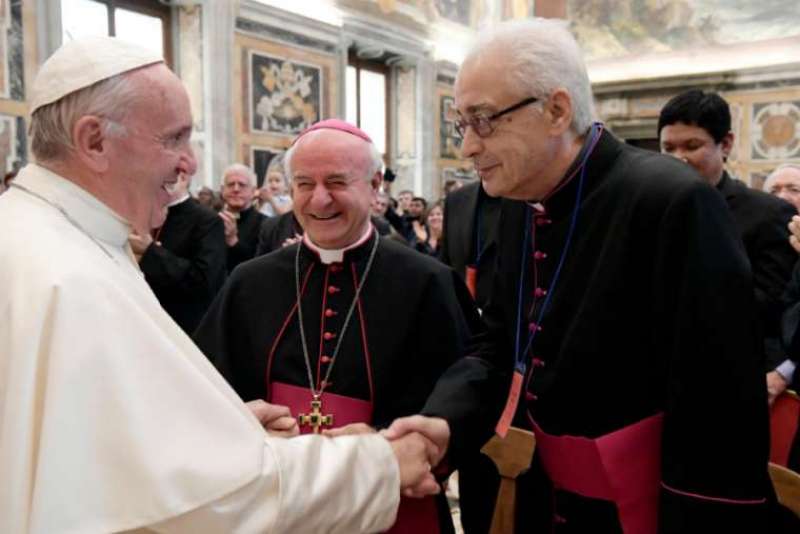The president of the Pontifical John Paul II Institute said Tuesday that despite recently published objections from students and alumni, he believes changes at the school are a move in the right direction.
Speaking July 30 to Vatican News, Msgr. Pierangelo Sequeri aimed to respond to a recently published letter, signed online by more than 250 students and alumni of the Institute, expressing concern about the dismissal of some faculty members, about new norms for governance and administration, and about shifts to the school’s curriculum, which will soon eliminate a chair in fundamental moral theology amid a new focus on the social sciences.
“We want to express our greatest concern: the loss of the formational approach, and therefore, of the identity of the Pontifical Theological Institute John Paul II,” the student letter, dated July 24, said.
“Many students have expressed their immense concern after the unexpected publication of the new statutes and the new program of studies for our new Institute, together with the sad news of the expulsion of two professors whose chairs have a central role in the formation offered by the institute," the students added.
Sequeri said that a change to the Institute’s curriculum and direction, called for by Pope Francis in 2017, and delineated explicitly in recently approved statutes, “responds to the great impulse of Pope Francis, who encouraged the Institute from the outset to equip itself with all the tools necessary to fulfill the mission entrusted to it since its creation of John Paul II, in the new context in which the Church lives its bonds of love in the context of the transmission of human life and of the Christian faith that pertain to marriage and the family, according to God's plan.”
“New tools mean instruments of knowledge: not only in the sphere of the so-called sciences and human rights, but also theological and pastoral studies, which must more closely be united to one another. New tools also mean adequate resources for updated information and practical training (international considerations, pastoral counseling, comparative law, family mediation, etc.). The meticulousness in the transparent and deep adherence to the richness of Catholic tradition and the authoritative magisterium, however, obviously does not represent an innovation,” he said.
Regarding the concerns of students and alumni, Sequeri said he had only been recently notified of “the arrival of a letter, signed by several dozens of ‘students and former students’ (we have had thousands, of course) which expresses concern about the possibility of losing the solid training guaranteed by the Institute and about their uncertainty concerning the passage and coordination of the new teachings.”
Its organizers say the letter was sent by email on July 25 to Archbishop Vincenzo Paglia, the institute’s grand chancellor, and to Sequeri, and by registered mail on July 26.
“I am a little surprised that the letter, addressed to me (and to Archbishop Paglia) has been made public even before the recipients gave feedback and had time to respond. In any case, many communications relating to legitimate requests for information and reassurance are already being fulfilled, at the same pace as the ongoing definition of the process. It will be my responsibility, of course, to draw up a final answer, based on the real data of all the formalities in full operation,” Sequeri added.
On the website publishing their letter, students of the John Paul II Institute say they have not yet received assurance that they will be able to continue in the academic programs they began, and that the dismissal of two theology professors suggests they will not be able to do so. They also expressed concern about whether dismissed faculty members had been treated with due process.
The students noted in particular the dismissal of two professors of theology: Msgr. Livio Melina, the school’s long-time president, and Fr. Jose Noriega, DJCM.
In a July 29 press release, the Institute said that Melina was dismissed because his chair in fundamental moral theology was discontinued, and that Noriega was being let go back because his position as superior of his small religious community is “incompatible” with his duties as a professor. Noriega has served as his community’s superior for 12 years; his term as superior concludes in January 2020.
Sequeri told Vatican News that although some students have raised concerns about the Institute's direction, others “have already written expressing confidence in the renewal and expansion of research and training in theological-pastoral and anthropological-cultural fields,” at the Institute.
Sequeri lamented the controversy surrounding changes to the Institute’s identity.
“The polemics, more or less malicious, that in this regard, try to involve the many students that look with trust to the project of a truly 'Catholic' knowledge and formation, obviously cultivate other interests. They are not the ones of John Paul II, not the ones of Pope Francis, not the ones of the Institute."
“Love must banish fear, communion must overcome distrust, and the beauty of our common cause must prevail over personal interests,” he added.
On their website, the students said they do not wish to cause discord.
Their aim, they wrote, is to share “objective facts based on the situation, without making judgments or considerations that could harm or go against the unity of our Church or against the image of the Holy Father, Pope Francis.”
The students added that they published their letter online to “inform the public about the serious situation that our Institute is now experiencing. Our wish is also to ask for justice and to see our rights and those of our professors guaranteed in a clear way.”

